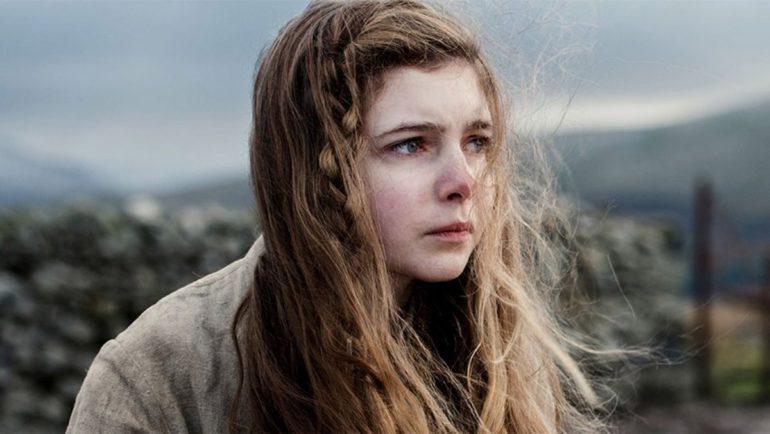Film Review: ‘Gwen’
By Guy Lodge
LOS ANGELES (Variety.com) – Handsomely cloaked in misty menace and heavy weather, an irate wind whistling through every pause in its soundtrack, “Gwen” turns out to be something of a wolf in another wolf’s clothing. Following a fatherless family battling demons of some description in the bleakest peaks of Wales, the film looks and sounds the part of an elegantly haunted gothic horror movie, only to skip past standard chiller expectations to disquiet its audience in more grounded, historically rooted ways. That the true terrors of William McGregor’s stern but stylish debut turn out to be less mysterious than they might initially seem — with the living patriarchy rattling more chains than any ghosts — may come as a surprise to genre fiends, particularly those who find the film via its U.S. deal with horror VOD platform Shudder.
Approach the film with managed genre expectations, however, and there’s much to admire (and duly shiver over) in its formidable, stormcloud-hued atmospherics, low-simmer storytelling and a particularly fine, unaffected breakout performance by teenage actress Eleanor Worthington-Cox in the testing title role. If McGregor’s lean script and taut direction both exhibit flashes of identity crisis — teasing the audience into jump scares with little payoff or bearing on the film’s more socially conscious themes — this is nonetheless a first feature that sets up its talented maker to go in almost any direction from here: “Gwen” is ultimately as plausible a calling card for kitchen-sink realism or revisionist costume drama as an outright spookfest.
The setting is the 19th-century Welsh hinterland, though the household that prematurely worry-worn adolescent Gwen shares with her stern, loveless mother Elen (Maxine Peake) and young sister Mari (Jodie Innes) is so austerely deprived as to seem positively medieval: even candlelight is a warming luxury in this cracked, creaky home of stone, timber and ash. (Production designer Laura Ellis Cricks does a fine job ensuring the film’s environs feel at once spartan and crammed with clammy texture.) Making a bare living from their sheep-and-potato smallholding, the family sorely feels the absence of Elen’s husband — believed by his daughters to be away at war, though their conviction that he shall return is clearly misplaced.
As their farm struggles, local slate-mine barons circle the land as a potential new quarry site, with little in the way of polite negotiation. Three unprotected women, after all, are expected to step aside and let masculine industry take its course. Played by Peake with her signature angular intractability, Elen is a steely holdout, if not exactly a doughty feminist heroine: Chilly and abusive to her daughters, she is frequently stricken by illness and a self-harming habit that may or may not have occult motivations. That we see her principally through her eldest’s anxious, impressionable eyes makes for a degree of sinister uncertainty, though the mounting harbingers of doom — spoiled potatoes, a flock of slaughtered sheep, a tragic end for the family horse — are undeniable, whether the forces behind them are supernatural or vindictively mortal.
The film’s first half cultivates this sense of mounting, claustrophobic hopelessness (the most abject branch of terror, surely) with slow-strangle aplomb. McGregor’s directorial rigor is perfectly served by Adam Etherington’s ravishingly desolate lensing, which picks out more shades of gray than a whole E.L. James library, and the invaluable sound design of Anna My Bertmark — who, as in Francis Lee’s equally weather-tousled “God’s Own Country,” captures and conducts an icy British wind as a separate score in itself. Indeed, “Gwen” is so effective in this regard that it winds up painted in a bit of a dank, moody corner by its final act: That no-way-out menace endures to the last, but McGregor’s somewhat gaunt narrative runs out of bones to rattle. A couple of nightmarish horror fakeouts, while suitably jolting, aren’t the answer; a slightly richer exploration of the film’s decayed family relationships (not to mention Gwen’s vaguely articulated bond with a sympathetic local boy) would be welcome.
Even in the film’s hazier spots, Worthington-Cox is a bright, focus-bringing presence. The actress — Elle Fanning’s younger self from 2014’s “Maleficent,” and an Olivier Award winner for the original West End production of “Matilda” — was 16 at the time of filming, and plays an often passively perceptive character with a deft blend of naive curiosity and old-soul exhaustion, from her timorous phrasing to her crumpled gait. For “Gwen” is a coming-of-age tale amid its other, more shadowed exertions, taking its character from girl to woman with few of the standard liberties that come with that transition: In this hostile man’s world, the horrors lie in just getting by.

